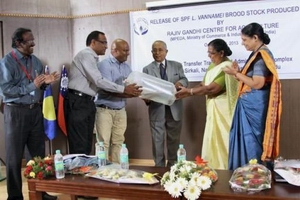 In a major development which will boost domestic production of export quality shrimp, the Rajiv Gandhi Centre for Aquaculture (RGCA) has developed a high quality variety — Litopenaeus Vannamei Broodstock — that is free of specific pathogens for the first time in India.
In a major development which will boost domestic production of export quality shrimp, the Rajiv Gandhi Centre for Aquaculture (RGCA) has developed a high quality variety — Litopenaeus Vannamei Broodstock — that is free of specific pathogens for the first time in India.The specific pathogen free (SPF) Litopenaeus Vannamei has capacity to produce quality seeds with faster growth and higher survival rates for commercial farm.
The status of SPF signify that the shrimps have passed through a rigorous quarantine and disease screening process that determined them to be free from specified pathogens of concern to culturists.
“The first batch of around 20,000 high quality SPF L. Vannamei Broodstock produced at RGCA facility at Visakhapatnam is ready for supply to approved shrimp hatcheries at half the price of imported stock,” an official release said.
SPF Litopenaeus Vannamei Broodstock has been developed along with the US-based Oceanic Institute. The high quality shrimp was unveiled today by the renowned fishery scientist E G Silas.
Generally, SPF L. Vannamei Broodstock is considered to be more resistant to diseases and can mate and spawn easily under captivity and the survival rates during hatchery rearing are generally higher.
However, one of the major obstacles for increasing the L.vannamei production is the non-availability of quality SPF broodstock in India in required quantities.
Currently, shrimp hatcheries import L. Vannamei Broodstock from the US, Thailand and Singapore with high shipping cost and transit loss due to mortality.
“Average cost of brood stock when it reaches the hatchery is estimated at Rs 5,000 and the higher cost of brood stock and transportation ultimately get transferred to the shrimp farmers who purchase seeds at a higher price,” it said.
High cost of broodstock is also prompting some hatcheries to source brood stock from shrimp ponds, which ultimately results in the production of poor quality seeds and subsequent crop loss to farmers.
It is reasonably easy for L. Vannamei farming and can substantially contribute to marine product export from the country considering the established infrastructure for shrimps farming.





